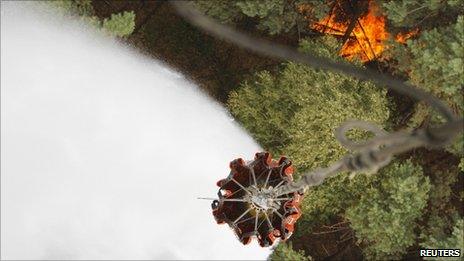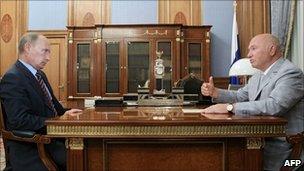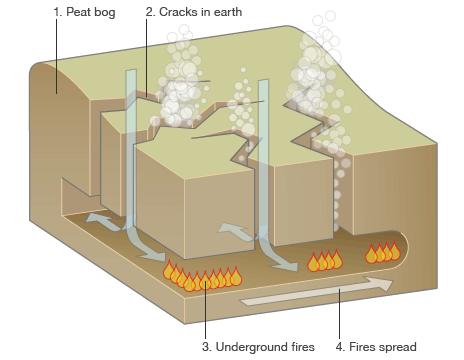Heatwave and fires to slow Russian economic recovery
- Published

Helicopters have been dropping water on some of the fires
Economists in Russia say they expect the current heatwave and wildfires to cut $15bn (£9bn) from economic output.
The figure, which does not include the cost of rebuilding homes, will slow down the country's recovery from the recent global crisis.
Hundreds of fires continue to burn in several regions of the country, including around the capital.
A top forestry official has been sacked amid rising public anger at the state's inability to control the fires.
Moscow's daily death rate is now twice what it would be normally for the time of year. While officials have been careful not to link this to the heat and smog, doctors have been doing so off the record.
The dense smog from forest and peat bog fires lifted for the first time in almost a week on Tuesday, being replaced by sunshine and then some rain.
It was welcome relief for the population, the BBC's Richard Galpin reports from Moscow.
Public anger
Experts from two major banks said the heatwave was having a serious impact on the national economy, particularly agricultural output.
Alexander Morozov, chief economist of HSBC in Moscow, said $4bn would be lost as a result of the government's decision to stop exporting wheat.
That decision was taken after it became clear that up to a third of this year's crop had died because of the lack of rain.
The extreme weather conditions and smog have also led to some factories closing down production lines temporarily.
The economic cost comes on top of the cost in human lives, with at least 52 people killed in the fires.
All this, our correspondent adds, has led to much anger with the authorities - both local and federal - who have been accused of not being prepared for this kind of crisis and of doing too little too late.

Mr Putin summoned Moscow's mayor
The head of Moscow region's forestry directorate, Sergei Gordeichenko, has been sacked by the government.
He had remained on holiday even when a state of emergency was declared in the region because of the wildfires.
President Dmitry Medvedev, who cut short his own summer holidays, said earlier that forestry service chiefs who had failed to return to work from holiday in spite of the fires should be sacked.
Yury Luzhkov, the mayor of Moscow, has come under Kremlin criticism for failing to return from his holiday sooner.
An unnamed Kremlin official said it was good that he had returned on Sunday but he should have returned earlier.
Prime Minister Vladimir Putin summoned Mr Luzhkov on Tuesday for a report on the situation.
Mr Putin also spent part of the day aboard a fire-fighting plane dropping water on forest fires in Ryazan region.
How peat bog fires spread

Peat is formed from decayed vegetation in bogs, moors or swamps.
Deliberate drainage or drought can expose peat to air.
Peat can then be ignited by wildfires or spontaneously combust. The air flow allows the peat to continue burning.
Once alight, the smouldering fire spreads slowly through the peat and can cause the ground above to collapse.
- Published9 August 2010
- Published10 August 2010
- Published9 August 2010